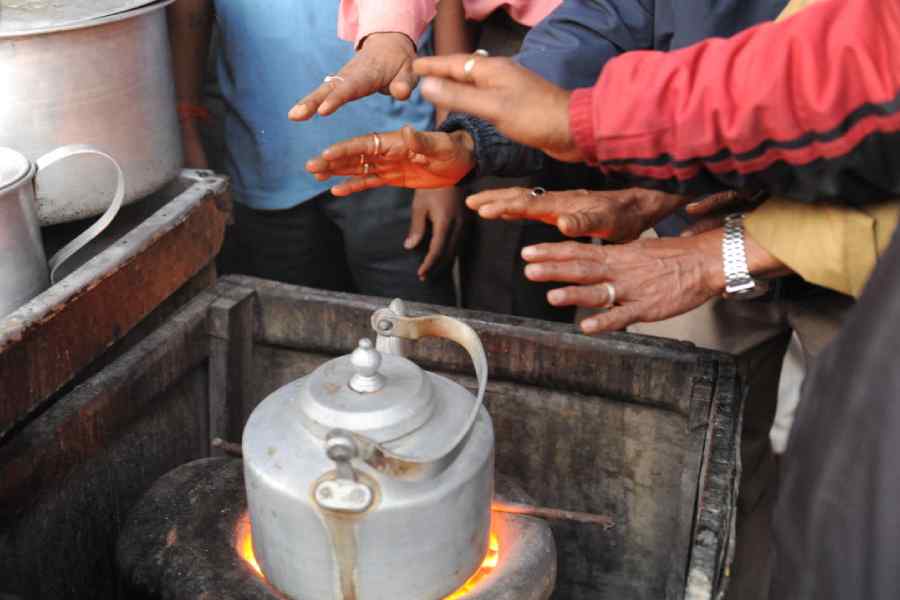Winter is coming
Sir — Albert Camus had found invincible summer in the midst of winter. Bengalis in Calcutta, on the other hand, have managed to spot winter amidst the overcast skies and smog that have been hanging over Calcutta like a pall recently. Be it monkey-tupis for school-going children, denim jackets for the young, high-neck sweaters for the middle-aged or capacious shawls for the elderly, Calcutta’s streets have already become a veritable runway for winter garments. Recently, I overheard a woman at a tea-stall cradling her steaming cuppa in her hands and telling her companion, “Ei toh sheeter shuru.” This on a day when the average diurnal temperature was 28° Celsius. Unlike Camus, Bengalis can perhaps find winter even amidst a heat wave.
Sanjana Dasgupta, Calcutta
New force
Sir — The victorious Zoram People’s Movement has managed to break new ground in Mizoram (“Fresh face”, Dec 5). For 36 years, Mizoram has been ruled either by the Congress or by the Mizo National Front. Defeating the MNF was no easy task. The Zoramthanga-led MNF government did its utmost to promote ethnic nationalism by showing its solidarity with the Kuki-Zo tribes of Manipur and the Chin people from neighbouring Myanmar, both of whom are mired in different conflicts. But it is clear that people were tired of the inability of the MNF to bring development to the state.
Rabi Rath, Jharsuguda, Odisha
Sir — Both the MNF and the Congress pursued narrow, divisive politics in Mizoram. While the MNF tried to exploit the ongoing ethnic strife in the Northeast and Myanmar, the Congress raised the bogey of Hindutva in this Christian-dominated state by highlighting the MNF’s ties with the Bharatiya Janata Party. Hearteningly, the people of Mizoram rose above such divisive agendas and voted for the ZPM. The ZPM’s call for a corruption-free regime and its promise of governance with the interests of the youth at its core clearly resonated with the electorate. The party must now live up to its image of being a force for change.
Lalfakawmi Biate, Calcutta
Sir — With the population of Mizoram being predominantly Christian, the church was extensively involved in the assembly elections. The church acted as the collective conscience of the people by trying to influence them to vote for candidates with integrity, setting parameters for electioneering and sometimes by trying to frame the agenda of the parties, especially in terms of supporting prohibition of alcohol. While religious institutions influencing voting choices is not novel in India, the separation of Church and State is absolutely essential for good governance. The ZPM must keep this in mind.
Radheshyam Sharma, Calcutta
Sir — The ZPM leader and chief minister-in-waiting in Mizoram, Lalduhoma, is being hailed as a giant slayer for unseating Zoramthanga. But he has a steep road ahead of him. Although the ZPM has won a clear majority, one must not forget that it was formed as a coalition of parties. As such, it may be vulnerable to the BJP’s machinations which usually ensue after it is defeated in state elections. What will not help is that northeastern states are often heavily dependent on the Central government. Lalduhoma must thus keep his flock together while ensuring that the promises he made before the polls are brought to fruition.
Bhagwan Thadani, Mumbai
Secret stash
Sir — In the five years since the electoral bonds scheme was introduced, more than half — 57% — of the funds extended through bonds have gone to the Bharatiya Janata Party. According to declarations submitted to the Election Commission of India, the BJP had received Rs 5,271.97 crore via such bonds between 2017-2022. The Congress, on the other hand, had received only Rs 952.29 crore. These figures must be kept in mind by the five-judge Constitution bench of the Supreme Court headed by Chief Justice of India, D.Y. Chandrachud, which began hearing a bunch of petitions challenging the validity of the electoral bonds scheme for funding political parties.
While there is nothing wrong with political parties receiving funding — this is, after all, a common practice the world over — the sources of such funds must be made public. The government has argued before the court that a political donation falls within the ‘core zone of privacy’ of a citizen and, as such, cannot be made public. But when coupled with a wider scrutiny of the alleged nexus between the BJP and crony industrialists, questions about accountability arise. Large, anonymous political donations carry with them the possibilities of money laundering and bribery.
Sukriti Sinha, Calcutta
Sir — Political parties in India have traditionally been averse to any sort of public scrutiny of the sources and expenditure of their funds. The astronomical sums needed to finance their operations — the BJP spent Rs 340 crore on campaigning for the slew of assembly elections held in 2022 — cannot be raised from party cadres and altruistic donors. These can only come from big businesses, most probably through quid pro quo arrangements. Electoral bonds legitimise opacity in the name of transparency, transforming the domain of election financing at a time when it is vital that electoral contests remain competitive and responsive to public interest.
Vinay Asawa, Howrah
Social charm
Sir — ‘Rizz’, the Gen Z shorthand for style, charm or attractiveness, beat other contenders, such as ‘Swiftie’ (an enthusiastic fan of Taylor Swift), ‘situationship’ (an informal romantic or sexual relationship) and ‘prompt’ (an instruction given to an Artificial Intelligence program), to be named the word of the year by Oxford University Press. What is interesting to note is that, of late, it is social media trends that decide the word of the year for many dictionaries.
Sebastian Kujur, Siliguri










